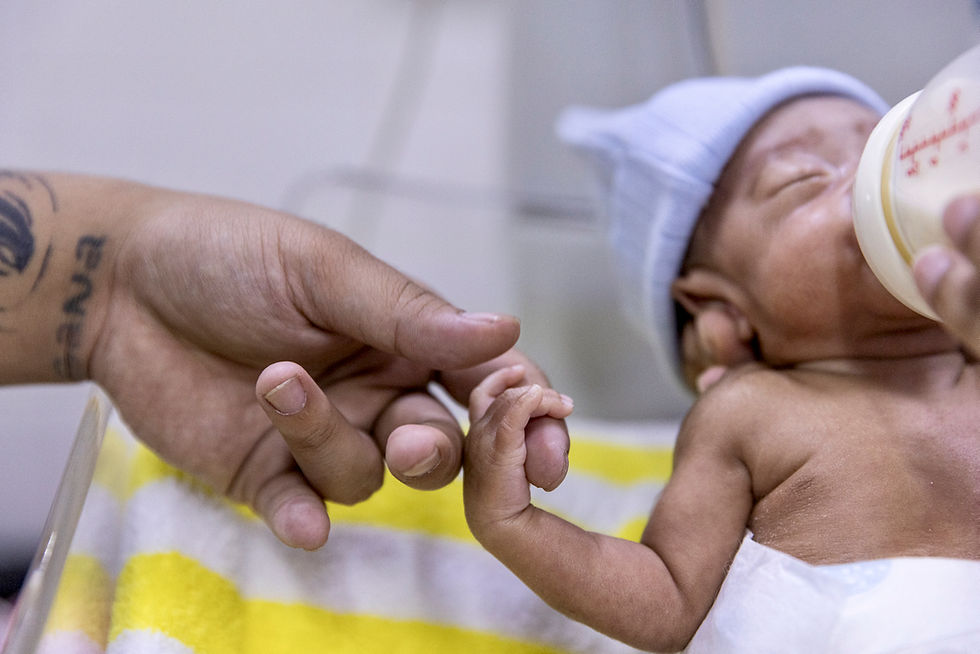Starting aid for the little ones
- stiftungkanthaboph
- Feb 6, 2024
- 3 min read

Babies who are born prematurely or have health complications after birth receive the support they need in the neonatology unit. Here they receive the medical care and attention they need to develop normally.
By the time they arrive at one of Kantha Bopha's hospitals with their babies, the mothers may have made long and arduous journeys. Most births in the country take place in a private setting or at a regional health centre - if complications arise, they are often taken to our hospitals in Siem Reap or Phnom Penh. "This is dangerous for the babies, who often arrive in a precarious condition," says Jean-Claude Fauchère. Since 2017, the neonatologist from Zurich has been assigned to introduce the Cambodian team to neonatal medicine and train them in the field.
Together with hospital co-founder Peter Studer and the local hospital management, he launched a project to gradually modernise and expand the neonatology unit. This includes medical treatments as well as nursing aspects - doctors and nurses from Switzerland are always present at local neonatal training courses. "The implementation of ideas and new approaches is in the hands of the local teams, and we accompany and support them with our knowledge and experience," explains Jean-Claude Fauchère, who was in Cambodia last November with instructional nurse Cécile Keller (Intensive care specialist and instructor).
Effective treatments do not always have to be expensive and high-tech. This is demonstrated by the use of caffeine: in premature babies, the respiratory centre in the brain is not yet fully developed. There are regular interruptions, i.e. pauses in breathing, during which the organs receive no oxygen. This is why relatives used to have to constantly stimulate their babies - to get them to breathe by shaking them. Day and night. But what if the waking mother or grandmother needs to go to the toilet, get something to eat or fall asleep? "Caffeine prevents respiratory arrest," says the neonatologist. But because caffeine is also considered a stimulant in Thailand, it took a year to get permission to import it from there to Cambodia. Vitamin K is also simple and effective - a single dose costs 15 to 20 centimes per child and prevents severe brain haemorrhages in the first few days of life.
These are just two of the many examples of how the situation for the very youngest babies has been improved on an ongoing basis. Equipment such as incubators and phototherapy lamps are used, as are gentle respiratory support methods and mechanical ventilation. The focus of nursing care is on issues such as temperature, hygiene, and positioning. Neonatology has reduced the infant mortality rate from since 2017.
Nutrition is currently paramount: Children who cannot or cannot absorb enough nutrition via the gastrointestinal tract receive intravenous parenteral nutrition with the necessary nutritional components. The search for a suitable solution took a long time and was finally successful as a result of the close collaboration between Denis Laurent (Director General of our hospitals), the neonatologists Jean-Claude Fauchère and Vincenzo Cannizzaro (University Hospital Zurich) and the nurses Cécile Keller and Simone Keller (Children's Hospital Berne), as well as the expert support of the gastroenterologist Christian Brägger (Children's Hospital Zurich). Jean-Claude Fauchère explains: "In this way, we are not only saving babies' lives, but we are also significantly improving their psychomotor development."
However, as in any neonatal unit, not all premature babies can be helped, and even the best medicine has its limits. "This leads to an in-depth examination of ethical issues," says the specialist. Triage is done every morning: which babies have a real chance of an acceptable quality of life? Where does intensive care treatment no longer make sense because it causes more pain and suffering without any visible benefit - or if it only delays death? How do you clarify these issues in a good way within the teams and then explain them to the parents? "It's like walking a tightrope - whether in Cambodia or Switzerland."
Jean-Claude Fauchère is in regular contact with his colleagues in Siem Reap and Phnom Penh. And he is impressed by what they have achieved in such a short time. In the future, he would like to focus on perinatal medicine, the health care of pregnant women and children shortly before and after birth. And on setting up a national project in collaboration with the Ministry of Health and private clinics: "We train staff in neonatal care and resuscitation by simulating the situation in the delivery room - with everyone involved". Jean-Claude Fauchère has already helped set up the Swiss equivalent, Start4Neo, and is planning a first workshop in Cambodia in May 2024. Everyone agrees that the effort is worthwhile: "In no other area of paediatrics is money so well invested as in neonatology - we, the children themselves, their families, and ultimately society get many times more back. For life."






















Comments